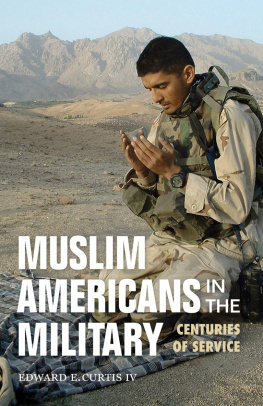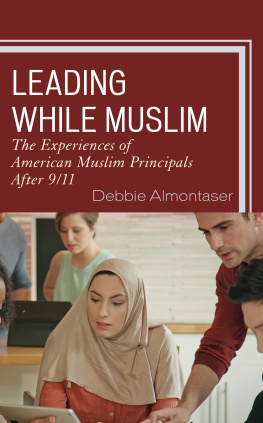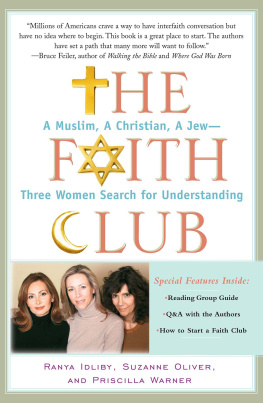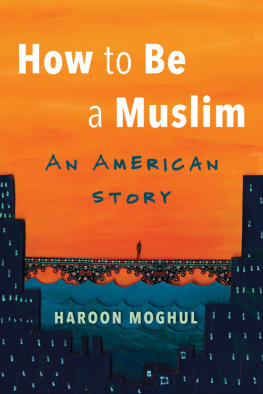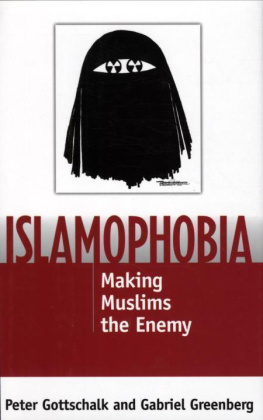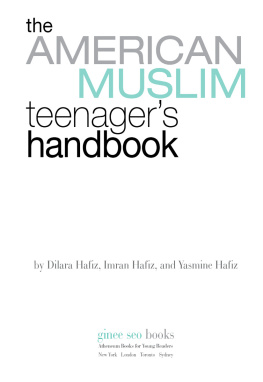Burqas, Baseball, and Apple Pie
Also by Ranya Tabari Idliby
The Faith Club: A Muslim, A Christian, A JewThree Women Search for Understanding
Burqas, Baseball, and Apple Pie
Being Muslim
in America
Ranya Tabari Idliby

The author and publisher have provided this e-book to you for your personal use only. You may not make this e-book publicly available in any way. Copyright infringement is against the law. If you believe the copy of this e-book you are reading infringes on the authors copyright, please notify the publisher at: us.macmillanusa.com/piracy.
BURQAS, BASEBALL, AND APPLE PIE
Copyright Ranya Tabari Idliby, 2014.
All rights reserved.
For information, address St. Martins Press, 175 Fifth Avenue, New York, N.Y. 10010.
First published in 2014 by PALGRAVE MACMILLAN in the United Statesa division of St. Martins Press LLC, 175 Fifth Avenue, New York, NY 10010.
ISBN: 978-0-230-34184-5
Our eBooks may be purchased in bulk for promotional, educational, or business use. Please contact the Macmillan Corporate and Premium Sales Department at 1-800-221-7945, ext. 5442, or by e-mail at .
Library of Congress Cataloging-in-Publication Data
Idliby, Ranya, 1965
Burqas, baseball, and apple pie : being Muslim in America / Ranya Tabari Idliby.
pages cm
ISBN 978-0-230-34184-5 (hardback : alkaline paper)
1. Idliby, Ranya, 1965- 2. Idliby, Ranya, 1965Family. 3. Muslim familiesUnited States. 4. MuslimsUnited StatesEthnic identity.
5. IslamophobiaUnited States. 6. MuslimsCultural assimilationUnited States. 7. MuslimsUnited StatesSocial conditions. 8. United StatesEthnic relations. 9. United StatesSocial conditions1980
10. United StatesReligious life and customs. I. Title.
E184.M88I35 2014
305.697073dc23
2013036413
A catalogue record of the book is available from the British Library.
Design by Letra Libre Inc.
First edition: January 2014
10 9 8 7 6 5 4 3 2 1
Printed in the United States of America.
For
my mothers faith,
my fathers reason,
and
my faith and reason in life:
Leia, Taymor, and Sami
* * *
One who lives forty days among a people becomes one of them.
Muslim proverb
Contents
4: A Crisis of Faith: Sticks and Stones Can Hurt
My Bones, but God Should Not Hurt Me
Acknowledgments
Thank you Elizabeth Kaplan for your perseverance, patience, and critical input during the early stages of the manuscript, without you there would be no book. Thank you Karen Wolny for seeing what others did not foresee. Thank you Adrienne Hart for your help editing, but most importantly for our late-night conversations and your emotional support. Thank you to the publishing team at Palgrave Macmillan, who worked hard on producing and marketing this book. Thank you to all those who have ever believed in me and who continue to support me, you know who you are. Finally, thank you Leia and Taymor, for being my pride, my joy, and my daily inspiration.
Prologue
How dare you sit here and not apologize for 9/11? an older, distinguished-looking gentleman demanded to know at the end of the Q&A session for a presentation of my book The Faith Club. I took a deep breath, willed my beating heart to slow, and desperately held on to what I hoped was a warm, empathetic smile as I bit down my mounting panic. I was a seasoned public speaker by then: as the American Muslim co-author of the New York Times bestseller The Faith Club, I had been welcomed in scores of communities across America as part of an extended book tour. What had started out as an intimate interfaith conversation in the privacy of our homes had been blessed with an enduring and rewarding public voice. Over three years, America had become one large Faith Club. My Faith Club co-authors, Suzanne and Priscilla, and I crisscrossed the country from the mountains of Boise, Idaho, to the shores of Jacksonville, Florida. We were embraced in dozens of churches, temples, mosques, universities, and seminaries, and I had learned to anticipate the most difficult of questions. As the last speaker in our three-way presentation, I always signed off with our Faith Club mantra: We at the Faith Club are not for editing our language but for enlightening our thoughts. So please feel free to ask us any questions on your mind. Dont be shy. We were in Omaha when the question I had never been asked before, never anticipated, came my way. This mans barrage took on a personal note, and I could feel Priscilla and Suzanne lean protectively closer to me as he delivered his final verdict: Your people are the source of violence all over the world. My people are your people, I assured him, naively hoping that he would change his mind once I revealed our shared patriotism. I am an American too. Oh no you are not! he fired back. Eventually, an event organizer caught on to the exchange and helped diplomatically usher my vocal assailant away. The following morning, en route to Boise, Idaho, I received an apologetic phone call from the event organizers, who graciously arranged for a large bouquet of birds of paradise flowers to be delivered to my hotel room. I was appreciative of the gesture even though I was more frazzled than offended.
My birds of paradise could not mask a sobering reality: the hyphenated identity of my American-Muslim family is not without its determined detractors. For many Americans, the words American and Muslim simply do not marry well; for many the combination is an anathema, a contradiction in values, loyalties, and identities. It may well take my children a lifetime to make peace with the two components of their identities. A 2006 USA Growing up in this environment is not without its challenges. Headline news, political campaigns, and events that are completely out of our control intrude, more often than we care for, on our family dinners and conversations.
This is the story of one American Muslim family. The story of how through our lives, our schools, our friends and neighbors, we end up living the challenges, myths, fears, hopes, and dreams of all Americans. We are challenged both by Muslims who speak for us and by Americans who reject us. We have far too often found ourselves at a loss for words, wrestling equally with issues from within the faith and the stereotypes that continue to flourish outside it. We have had to learn and relearn what it means to be American and Muslim today. Yet we refuse to give up on either. Through it all, we have chosen to speak up, to value and honor both. We have chosen love, patriotism, and faith over hate, alienation, and disillusionment. We are mothers, fathers, sons, and daughters. Our hopes and challenges are Americas own. In spite ofand in defiance ofall the naysayers, we remain American, Muslim, and proud.
One
Why Would Anyone Choose to Be a Muslim?
He who chooses to enter Paradise through its best door must please his parents.
Paradise lies at the feet of your mother.
The Prophet Muhammad
Walking home from a friends house one day, my ten-year-old son spotted a poster of the legendary boxer Muhammad Ali and told me how disappointed he was to find out that Ali was not a real Muslim, but a convert. Dont be silly, I said, thinking I had this parenting moment completely under control. When a person chooses to convert, it may be even more meaningful. It means they have thought about their religion and made it their personal choice, not just an accident of birth. I was not ready for his quick and shocking retort: Why would anyone choose to be a Muslim?
Being Muslim in America was not always the challenge it seems to be for my children today. At sixteen, my father, a Palestinian refugee, was given a one-way ticket to the United States by his father. His mission was to get an education. He landed in Chicago and worked his way through college. It took him ten years, but he graduated with a double major in math and engineering from the University of Illinois. He worked on the docks and held down a second job at a cafeteria where he enjoyed flirting with the sorority girls. He often faced the brutal Chicago cold without the luxury of the coat he shared with his older brother and cousin. Whoever was up first in the morning was warm for the day. Nothing in his early, pampered childhood could possibly have prepared my father for his new life. He was the privileged son of a medical doctor whose landed wealth was lost with the loss of Palestine. His father, Dr. Rashid, could not even afford to buy my father a ticket back to Jordan when my fathers mother, the renowned beauty of Tiberius, died at the age of thirty-eight. Medically, she died of kidney failure, but family lore insists that she died from the heartache of loss. My father would not learn of her death until he returned home as a graduate at the age of twenty-six.
Next page

